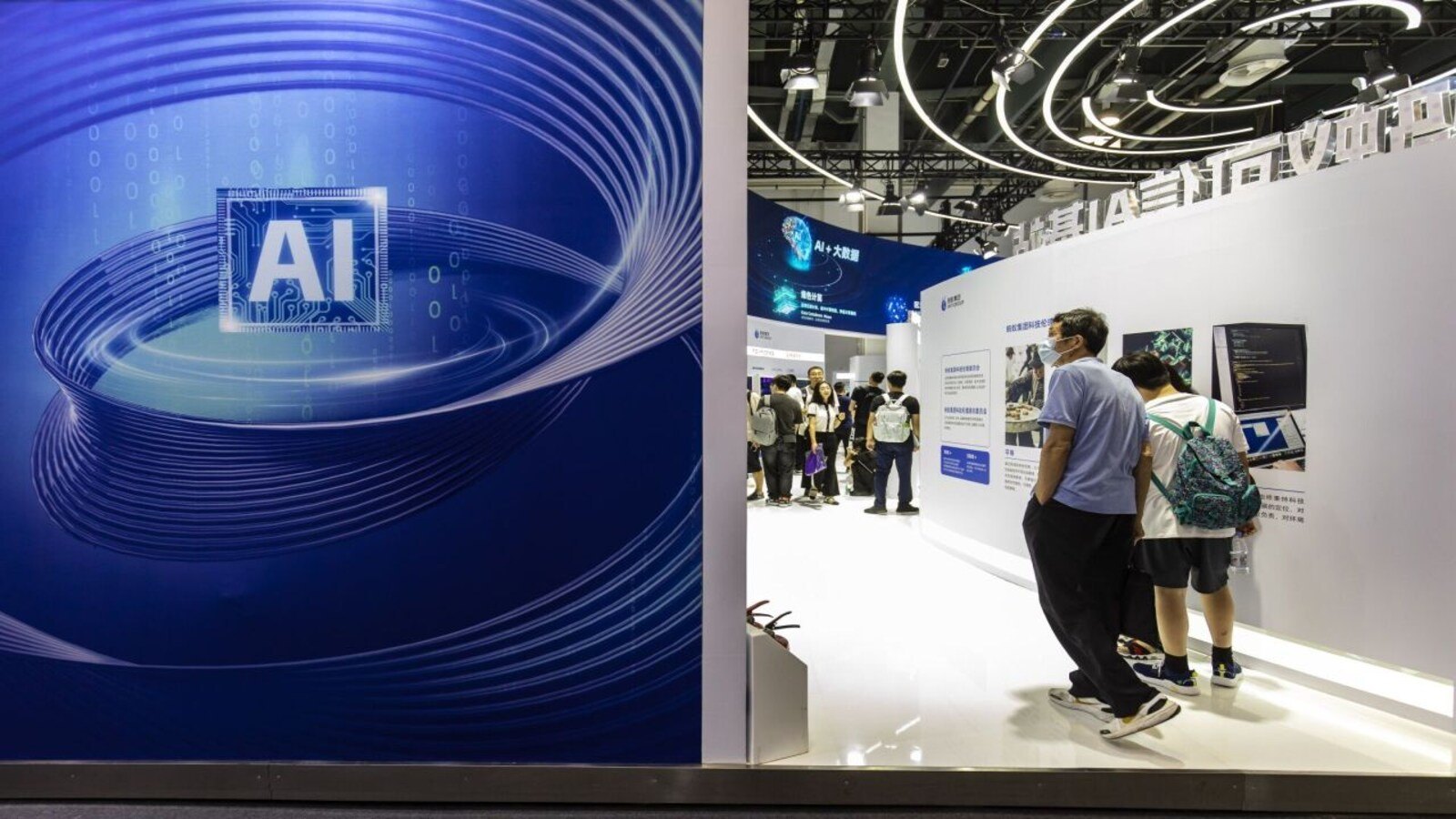In 2025, artificial intelligence is no longer the exclusive story of American technology companies.
With the profound changes in the global technology capital structure, the "six AI giants" in emerging markets represented by Asian technology stocks-TSMC, Tencent, Alibaba, Samsung Electronics, SK Hynix and Xiaomi Group-are making substantial business progress and strong market performance, rewriting the global AI investment landscape.Especially in the Hong Kong stock market, AI-themed stocks exploded in silence and became one of the very few structural assets that received continuous increases in global funds.
Bloomberg data shows that as of August 2025, these six companies together contributed as much as 37% to the growth of the Bloomberg Emerging Markets Equity Index, making them the absolute main force of the index's rise this year.More representative is that the status, commercialization path and strategic investment of these six companies on their respective AI tracks have gradually moved from the "concept stage" to the "profit redemption period."
TSMC's
As the world's most advanced wafer foundry company, TSMC is the cornerstone of computing power behind AI chips. Almost all high-performance AI chips (HPC)-whether it is NVIDIA's H100, AMD's MI300X, or Apple and Google's customized AI chips-all need to rely on TSMC's 3nm or more advanced process technology.In the company's revenue in the second quarter of 2025, AI-related orders increased by more than 50% year-on-year, pushing the stock price up by approximately 11.27% since the beginning of the year to close at NT$1,185.00.Its newly put into operation in Kumamoto in Japan and Arizona in the United States are expected to further release production capacity in 2026, strengthening its global OEM dominance. Goldman Sachs pointed out in its latest quarterly outlook: "TSMC represents the upper limit of the AI hardware profit chain and is AI infrastructure The core scarce asset.”
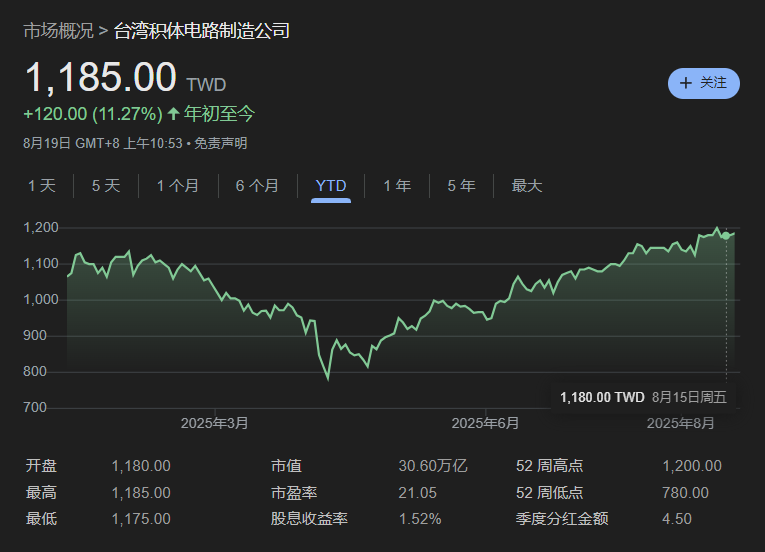
Tencent holds Alibaba Xiaomi Group
In the Hong Kong stock market, there are three China technology giants playing key roles in the AI narrative: Tencent Holdings, Alibaba and Xiaomi Group.
Tencent's self-developed large-scale model "Mixed Origin" was quickly implemented after its official release in 2024, especially to achieve product-level integration in WeChat, QQ, Tencent advertising and corporate WeChat ecosystems.According to the company's disclosure, the number of API calls to the Mixed Origin Model has exceeded 10 million in the first half of 2025, and the conversion rate of advertising recommendations and intelligent customer service has increased significantly.Tencent Advertising's Q2 revenue in 2025 will increase by more than 30% year-on-year, becoming one of the new growth engines.Share prices rose 41.59% year-to-date to close at HK$589.00.Morgan Stanley maintains an "overweight" rating on Tencent and believes that its "platform-based AI ecosystem" has high reuse and commercialization breadth, and will bring stable cash flow in the medium and long term.
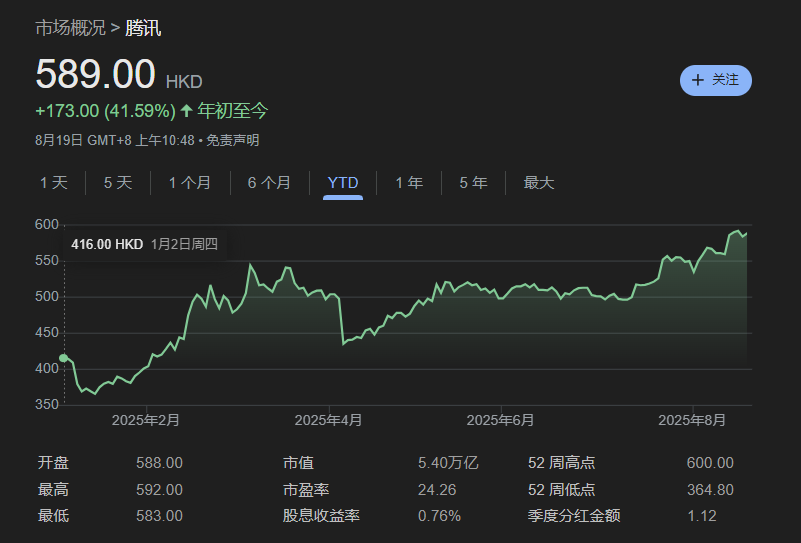
Alibaba focuses its AI strategy on the dual advancement of cloud computing and industry applications.Its "Tongyi Thousand Questions" model not only supports multimodal capabilities such as Wensheng, Wensheng, and code generation, but also deeply integrates with Alibaba Cloud to form a closed-loop enterprise-level AI service.In Q2 of 2025, Alibaba Cloud's AI revenue increased by 48% year-on-year, achieving a profit turning point for two consecutive quarters.Ali has also embedded a number of AI tools in the Taobao e-commerce platform to comprehensively improve operational efficiency from customer service, product selection to recommendation systems.Shares rose 46.25% year-to-date to close at HK$118.90.Citigroup believes: "Alibaba has the dual ability to transform from platform to infrastructure, and the current valuation still does not reflect its AI commercialization potential.”
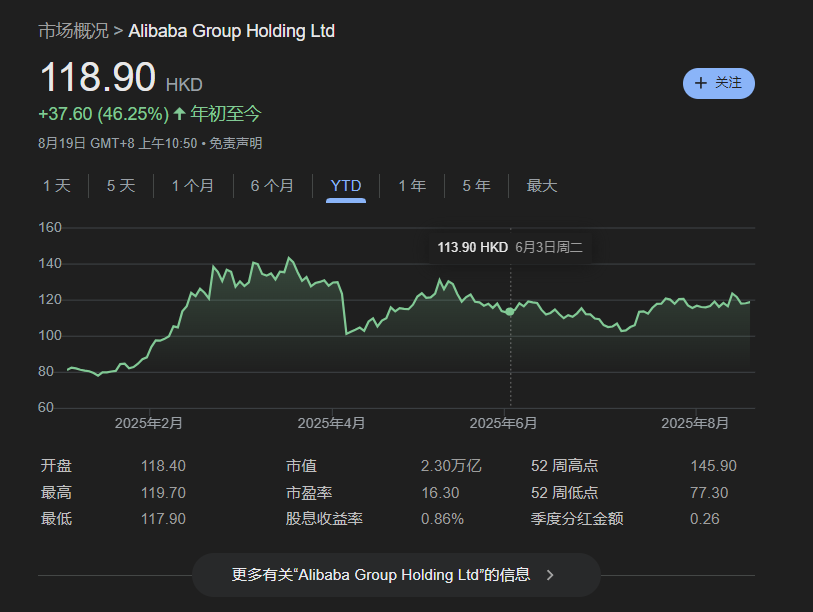
Xiaomi Group has become one of the most imaginative players in Hong Kong stocks in the AI wave with its AIoT layout and vertical integration path of terminal + chip + system.After the self-developed large model was connected to the Paper OS, Xiaomi formed a closed loop of products in scenarios such as voice assistants, image processing, and smart home collaboration.At the same time, the "SU7" smart car released in 2024 will also open up a new profit pool for it.Shares have risen 55% since the beginning of the year to close at HK$52.70.UBS pointed out: "Xiaomi has integrated AI capabilities from chips, OS to applications, and is a representative 'AI full-stack company' in the East Asian market.”
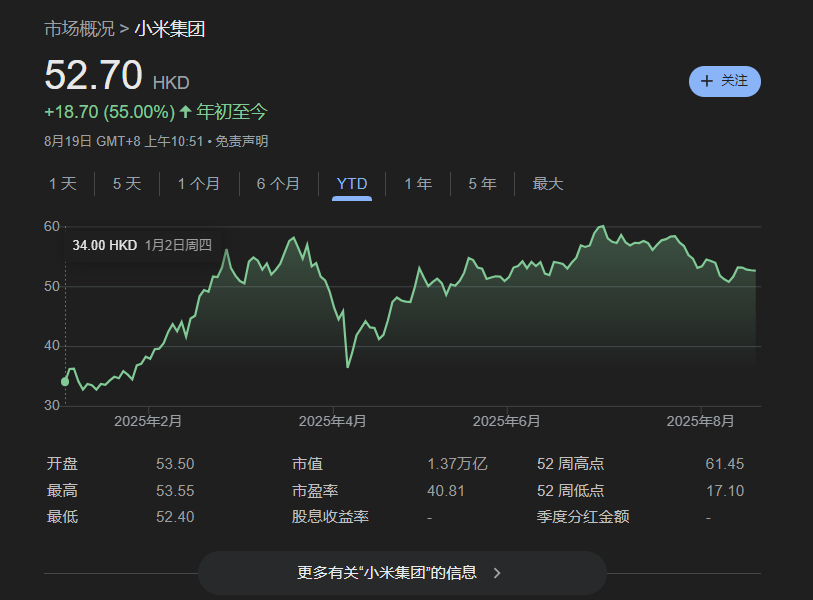
Samsung Electronics Hynix
In the Korean market, Samsung Electronics and SK Hynix also showed outstanding performance.Samsung's share price rose 31.84% during the year to close at 70,400 won. Its upgrades to core components such as AI smartphones, AI camera chips, and AI server modules pushed sales of the Galaxy series to exceed expectations;SK Hynix led the rise of the "Big Six" with a 55.08% increase, closing at 265,500 won.Its HBM3E high-bandwidth memory is widely used in AI training chips for customers such as NVIDIA and Google Cloud. The shortage of supply has driven both its ASP and gross profit margins to rise.BlackRock commented: "SK Hynix is leading the global AI storage standard, and HBM's technological leadership will not be shaken in the next two years.”
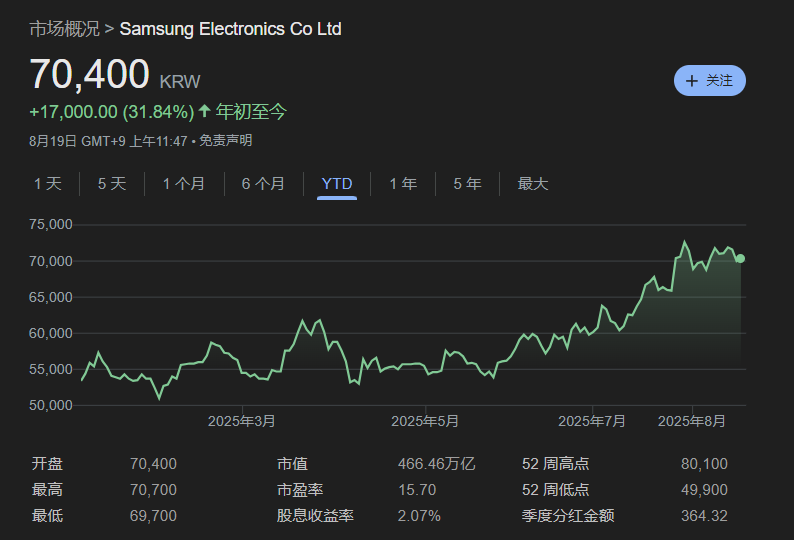
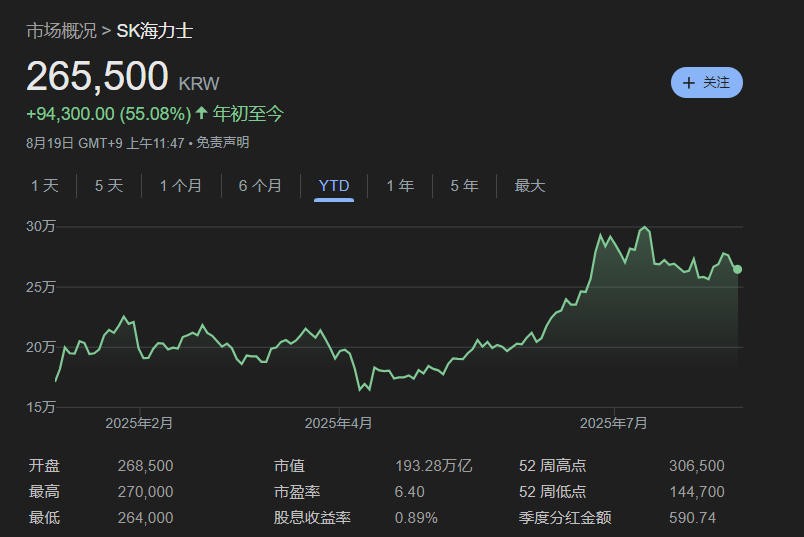
The strong performance of these companies is not only reflected in their stock prices, but also reflects the substantial changes AI has made in the fundamentals of emerging market technology companies.UBS said that the emerging markets technology sector is expected to grow by 15% EPS in the next 12 months of 2025, higher than the overall emerging markets average of 6%.AI-driven high-tech value-added products and services are significantly boosting corporate profit margins and valuation anchors.
In this context, many institutions have begun to systematically increase the allocation weight of AI assets in emerging markets.
Of the US$611 billion in assets managed by AllSpring Global Investments, it has increased the proportion of AI-related stocks in emerging markets to nearly 25% in 2025.Alison Shimada, its global head of equities, bluntly said: "AI will have a structural transformation effect on the release path of demographic dividends in emerging markets, and this trend may continue for 10 to 20 years.GIB Asset Management also emphasized that one-third of the returns in emerging markets in the next three years may come from AI-related companies, and South Korea, China, Malaysia and other countries will gain "disproportionate benefits" in AI data and application scenarios.
At the Hong Kong stock level, the rise of AI has become an important signal for market style switching.Although external macro factors are still complex-including high fluctuations in U.S. bond interest rates, pressure from RMB depreciation, and a slower pace of recovery in the mainland's economy than expected-AI-themed stocks have shown obvious independence.Beishui Capital continues to add positions in core assets such as Tencent and Xiaomi, and the valuation of some top AI technology stocks has begun to be re-priced.
AI may become the main line of medium-and long-term configuration
Entering the second half of 2025, AI will remain one of the main narrative logics of global capital markets.Emerging markets, as multiple core links in the AI industry chain, are rising simultaneously. It is expected that more globally competitive platform-based AI companies will be born in the next three to five years.As the technology stack continues to expand from underlying chips to intermediate platforms and then upstream applications, AI investment in emerging markets will also shift from "hardware-led" to "soft-software collaboration", promoting the second wave of value revaluation.
In the long run, the synergistic effects of China, South Korea, India, Malaysia and other countries in terms of AI policies, talents and infrastructure will be further demonstrated, and the industrial chain will accelerate the transition from "following innovation" to "participatory definition."AI is not only a technological revolution, but also a paradigm shift in capital allocation logic.In the future,"technology-driven + profit-cashing" will become the core criterion for investors to inspect AI companies.
The Hong Kong stock market will also regain the dual support of valuation and structural growth in this trend.The Hong Kong Stock Exchange has accelerated the review process for the listing of AI technology companies. At the same time, the SAR government has increased its support for AI innovative enterprises. In the future, it is expected to attract more AI enterprises to list in Hong Kong and form a new science and technology capital highland.Leading companies such as Tencent, Alibaba, and Xiaomi are expected to further release the AI ecological dividend and drive the overall technology sector of Hong Kong stocks to rise.
